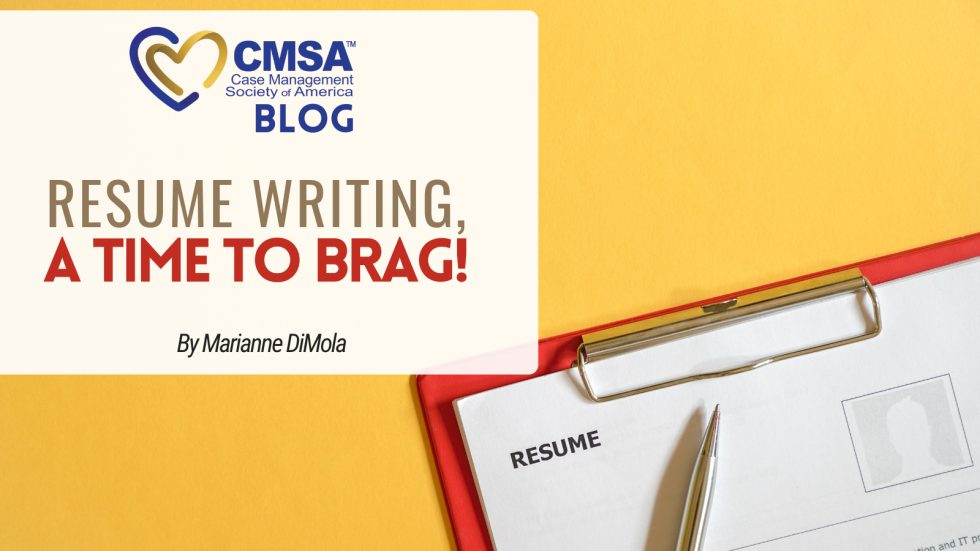By Marianne DiMola
Writing a resume is probably one of the most difficult documents to write, and yet one of the most important ones we need to do. I often make dating analogies to looking for a job. So, picture a dating app. You look at a profile and it really doesn't say anything. What do you do? You go right by it. Don't let that happen to your resume!
I see two problems with writing a resume. One is that many people wait until they need to write a resume, and that is one of the worst times to sit down and talk about how wonderful you are. Usually, that is because if we need to write a resume, we have been forced out of a job due to layoffs or we are no longer happy. Bottom line: we are not in the right frame of mind.
The second problem to writing a resume is you. Case Managers are terrible advocates for themselves. Yes, I said it! Case managers are great advocates for everybody else, anyone else, but not themselves. Here are a few tips on how to write a resume. There's more information on how to do this on our website and prior issues of CMSA today.
Presentation
A resume is looked at for 6 to 8 seconds; that is not a lot of time. Therefore, it is critical that the resume is presentable and gets to the point.
Make sure all fonts, size and formatting are correct and not too small. (As in this example):

Spellcheck, please use it, but do not depend on it! Spellcheck does not recognize medical terminology or jargon, as in these examples:
- Utilize Interquel criteria
- Work with CMSA guidelines
Also, make sure you are in the proper tense. The current position is present tense:
Oversees, Lead, Deliver, Implement, Maximize, Remodel, Track
Previous positions are in the past tense. Make sure to change tenses as you update new positions.
Past tense: Oversaw, Led, Delivered, Implemented, Maximized, Remodeled, Tracked
Bullets Need to be consistent in formatting along with the use or nonuse of periods.
Take out the fluff
Does this look familiar?
Professional Highlights
|
|
What does all that mean? Have you done it? How? Where? To what extent? If any of these are a true skillset you will have it bulleted in your resume. Putting it on top doesn’t add any real information. In my humble opinion, it takes up space without adding value. Save the room for your accomplishments.
Instead of “Transitions in Care”
- Developed and implemented a Transition of Care Program to reduce readmissions
Instead of “Data Analytics”
- Successfully used predictive modeling analytics to identify and develop population opportunities
Take the guesswork away and show your skills!
Power Words
I talk about this all the time. A resume is the only opportunity you have to say, “interview me!”
Who would you interview in the following examples?
- Participates in UM meetings
- Submits reports for upper management review
Or
- Coordinates and leads monthly Utilization Management meetings
- Collects data, prepares information, and presents to CMO, CFO and regional leaders
Your resume is an evergreen document. Update it with every evaluation and professional achievement. Try to update it when you are feeling positive about your career. This feeling will be reflected in your words.
Finally, remember to update your LinkedIn profile and include your contact information on your resume!
Bio: Marianne DiMola has more than twenty-five years of experience in healthcare human resources management and career development. Her experience includes branch directorships with two of the country's leading home healthcare organizations, Bayada Nurses and Nursefinders. She is a founding member of CMSA's TriChapter New York Conferences and served as the Executive Director of the New York City Chapter of CMSA for twenty years and served on several national committees. In addition, Marianne is one of the founders of Pathway Medical Staffing, a nationally recognized leader providing case management recruitment and retention advisory services, HEDIS staffing, and project management. Ms. DiMola was also the Senior Vice President of National Sales and Operations for Medical Staffing Network, Care Management and Vice President of Care Management at Cross Country. Ms. DiMola is currently President and co-founder of Global Care Management, specialist in care management staffing and consulting. Ms. DiMola presented "Essential Strategies" at the CMSA National Conference and CMSA, NYC Chapter in 2011, Long Island CMSA Conference 2012, "The Secret Victory of Case Managers" at CMSA National in 2013 and has authored and coauthored, "Essential Strategies to Cultivate Your Career" for the Professional Case Management; Vol. 17/No. 5 “Next Level Case Management Guide Book, Co-Authored “The Great Exodus Hitting Case Management” in CMSA today March 2022, coauthored “Regional Impact of COVID-19 on Acute Case Management Practice” for The Case Management Journal, Volume 3, May/June 2022 and in 2021 presented multiple times to the Case Management Community. This is Marianne’s second Blog for CMSA.
Once you've used Marianne's tips to elevate your resume, find your perfect fit in the CMSA Career Center: https://careers.cmsa.org/jobseekers/


Thanks Marianne. Great advice.
Hi Laura, I never knew to look here – thanks for the kind words!
Thank you Marianne for this valuable information..You are a true expert in the field. My experience working with you resulted in bringing well qualified case managers to my team. Thank you !
Thank you my friend!
Very valuable information! Thank you, Marianne.
Thank you! Sorry for the delay I didn’t know to look for comments!
Hi Marianne! This is such helpful and practical information! Thank you for sharing your expertise. I really like yur advice to work on your resume when you’re in a positive frame of mind. That makes so much sense! 🙂 Thanks again and hope to see some more blogs from you!
Thanks, Marybeth! I really appreciate your note!